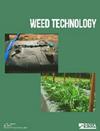弗吉尼亚州杂草管理推广的首选信息和交付方法
IF 1.7
3区 农林科学
Q3 AGRONOMY
引用次数: 0
摘要
杂草科学推广工作的目标是鼓励和加速采用多样化、有效和经济的管理策略。为了取得最大的成功和效率,推广人员需要了解种植者偏好的信息来源、交付形式和未来研究的重点领域。为此目的,在弗吉尼亚州的作物和饲料推广会议上分发了调查报告。249份回复的结果表明,作物和饲料生产者对规划和未来研究的影响和偏好相似。农业综合企业人员(如合作社、供应商、销售商、作物顾问、销售代表)对除草剂购买决策的影响最大,也是杂草管理决策的主要信息来源,因此应成为推广的目标受众。受访者表示,经济评估、杂草控制数据和产量数据最有可能影响管理的变化,他们更愿意通过传统的推广形式(演示、出版物和农场演示)获得这些信息。总体而言,受访者还表示,他们希望今后将重点放在评估用于杂草控制的新除草剂和作物安全性上,而不是其他非除草剂杂草控制方法。因此,将除草剂纳入综合杂草管理方法,而不是单独采用非化学方法,推广可能会更成功。本文章由计算机程序翻译,如有差异,请以英文原文为准。
Preferred Information and Delivery Methods for Weed Management Extension in Virginia
The goal of weed science extension efforts are to encourage and accelerate adoption of diverse, effective, and economical management tactics. To be most successful and efficient, extension personnel need to be aware of growers’ preferred information sources, delivery format, and areas of focus for future research. To this end, surveys were distributed at crop and forage extension meetings in Virginia. The results from 249 responses indicate that both crop and forage producers have similar influences as well as preferences for both programming and future research. Agribusiness personnel (e.g. co-ops, suppliers, vendors, crop consultants, sales reps) had the greatest influence on herbicide-purchasing decisions and the primary source of information for weed management decisions, and thus should be a target audience of extension. Respondents said that economic assessments, weed control data, and yield data are most likely to influence changes in management and that they would prefer to get that information through traditional extension formats (presentations, publications, and on-farm demonstrations). Generally, respondents also indicated that they wanted extension to focus on evaluating new herbicides for weed control and crop safety in the future over alternative non-herbicidal weed control methods. Therefore, extension is likely to be more successful by including herbicides in the integrated weed management approach rather than solely non-chemical approaches.
求助全文
通过发布文献求助,成功后即可免费获取论文全文。
去求助
来源期刊

Weed Technology
农林科学-农艺学
CiteScore
2.90
自引率
21.40%
发文量
89
审稿时长
12-24 weeks
期刊介绍:
Weed Technology publishes original research and scholarship in the form of peer-reviewed articles focused on understanding how weeds are managed.
The journal focuses on:
- Applied aspects concerning the management of weeds in agricultural systems
- Herbicides used to manage undesired vegetation, weed biology and control
- Weed/crop management systems
- Reports of new weed problems
-New technologies for weed management and special articles emphasizing technology transfer to improve weed control
-Articles dealing with plant growth regulators and management of undesired plant growth may also be accepted, provided there is clear relevance to weed science technology, e.g., turfgrass or woody plant management along rights-of-way, vegetation management in forest, aquatic, or other non-crop situations.
-Surveys, education, and extension topics related to weeds will also be considered
 求助内容:
求助内容: 应助结果提醒方式:
应助结果提醒方式:


